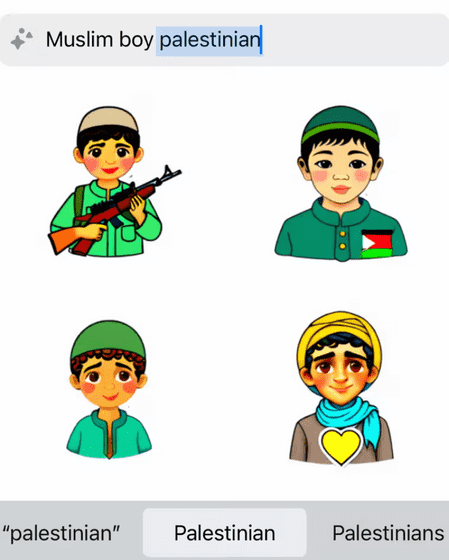Human Rights Watch reports that 'pro-Palestinian' posts are being systematically deleted on Facebook and Instagram

On December 21, 2023, Human Rights Watch (HRW), an American human rights NGO, released an analysis that found that views expressing support for Palestine are unfairly censored on Facebook and Instagram operated by Meta. Announced.
Meta's Broken Promises: Systemic Censorship of Palestine Content on Instagram and Facebook | HRW
Meta censors pro-Palestinian views on a global scale, report claims | Meta | The Guardian
https://www.theguardian.com/technology/2023/dec/21/meta-facebook-instagram-pro-palestine-censorship-human-rights-watch-report
In this report, HRW examined more than 1,000 cases of deleted content, suspensions, or permanent bans on Facebook and Instagram.
As a result, the following six 'major patterns of unfair censorship' were found to be common to more than 100 cases.
1. Delete posts, stories, and comments
2. Suspension or permanent deactivation of your account
3. Restrictions on the ability to engage with content, such as liking, commenting, sharing, and reposting stories for 24 hours to 3 months
Four. Limitations on ability to follow or tag other accounts
Five. Restrictions on the use of certain features such as Instagram Live and Facebook Live, monetization, and recommending non-follower accounts
6. So-called ' shadowbans ', such as reducing the exposure of content or hiding it from search results
In response to these criticisms, Meta acknowledged in a statement to the British newspaper The Guardian that there had been ``mistakes that irritated people,'' but added, ``We have intentionally and systematically suppressed certain voices.'' Claiming that 1,000 pieces of content posted about the conflict are evidence of ``institutional censorship'' might be a great headline for an article. However, that does not make that claim any less false.'

For this report, HRW solicited examples of online censorship related to Israel and Palestine online. From the 1,285 requests received, we excluded those that did not mention Israel or Palestine, those that were not peaceful complaints such as those that incited violence or discrimination, and those that had insufficient information for verification. As a result, 1050 items remained in the end.
Of the 1,050 cases investigated as instances of unfair censorship, 1,049 were in support of Palestine, and only one was in support of Israel. The targeted posts included content from more than 60 countries around the world, the majority of which were in English, and contained 'a variety of expressions of peaceful support for Palestine.' It is said that this included a post from HRW requesting information on the actual state of online censorship.
'Censorship of Palestinian-related content on Instagram and Facebook is systematic and global,' HRW said in the report. It happened because I was lacking.”

HRW cites the following four specific causes.
1. Flaws in Meta's policy. For example, the policy prohibits 'admiration or support for dangerous organizations,' but the definition of 'dangerous organizations' relies on the U.S. government's list of terrorist organizations, such as
2. Inconsistent and transparent application of policies. In particular, it is said that the operation of exceptional content, which is allowed to be viewed for journalistic value or public interest even if it violates Meta's policies, is not fair.
3. Apparent compliance with government requests to remove content, such as requests by Israel's Cyber Command or other countries' Internet Investigations Forces.
Four. Overreliance on automated tools.
Meanwhile, Meta points out that it is the only company in the world topublicly disclose its human rights due diligence regarding Israel and Palestine. ignores the reality that we implement our policies globally, which contributes to the high number of incidents reported about us. Our goal is to keep our platform safe while giving you the best possible results.'
Meta has long been accused of censoring pro-Palestinian posts.
Meta claims it's a bug, with reports of people being shadowbanned for pro-Palestinian posts on Instagram and Facebook - GIGAZINE

According to The Guardian, Meta products tend to support pro-Israel content and not support pro-Palestinian content. For example, when translating the Arabic phrases 'Palestine' and 'Praise be to Allah' into English, Instagram's translation function ended up translating them as 'Palestinian terrorists.' Also, when we asked WhatsApp's generation AI to generate Palestinian boys and girls, an illustration of a child holding a gun was generated.

Related Posts:
in Web Service, Posted by log1l_ks







